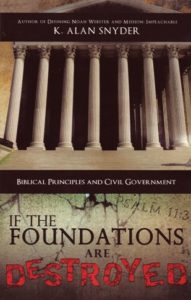I have taught Biblical principles in my courses for the past twenty-seven years. I’ve wanted my students to understand that we must look deeper than outward appearances when we scrutinize historical events.
A principle is a source or origin of anything; it is a general truth, that is, a truth that is so broad and sweeping that many other truths can be considered off-shoots of it.
The idea of general truths that apply to all of society formerly had wide acceptance in America. The key word is formerly. So my goal has been to reintroduce those principles as best I can through my teaching and writing.
 That’s why, back in 1993, I published a book based on the principles I teach in the classroom. I’ve revised it a few times along the way.
That’s why, back in 1993, I published a book based on the principles I teach in the classroom. I’ve revised it a few times along the way.
If the Foundations Are Destroyed: Biblical Principles and Civil Government is a primer on the principles that I believe come out of Scripture and ought to be applied to everything in our society.
The onset of evolutionary philosophy and the pragmatism to which it has given birth have led us to think more in terms of expediency than principle. People sacrifice principles to that which is less troublesome.
Standing on principle can be wearying when no one else seems to care or understand what you are doing. Yet God calls on Christians to make His principles the foundation of all they say and do.
Christians get in trouble when they conform to the world’s thinking and ignore principles. They are tempted not to cause waves, forgetting that the world already is a turbulent place and that men are seeking—whether they realize it or not—for the stability of fixed principles.
America has always had those turbulent times; historians probably understand that better than most. There was a presidential election in 1800 that was quite controversial. Leading up to that election, one man, Jedidiah Morse—a Congregational minister, the compiler of the first American geography book, and father of Samuel F. B. Morse, the inventor of the telegraph—preached a sermon that issued the following warning:
Our dangers are of two kinds, those which affect our religion, and those which affect our government. They are, however, so closely allied that they cannot, with propriety, be separated.
The foundations which support the interests of Christianity are also necessary to support a free and equal government like our own.
To the kindly influence of Christianity we owe that degree of civil freedom, and political and social happiness, which mankind now enjoy. In proportion as the genuine effects of Christianity are diminished in any nation, either through unbelief, or the corruption of its doctrines, or the neglect of its institutions; in the same proportion will the people of that nation recede from the blessings of genuine freedom, and approximate the miseries of complete despotism.
Whenever the pillars of Christianity shall be overthrown, our present republican forms of government, and all the blessings which flow from them, must fall with them.
If that dire warning was applicable in 1799 when Morse preached that sermon, how much more so today?
America may be more bitterly divided now than it has been since the Civil War, and there is no guarantee that Biblical principles will gain the ultimate victory in this earthly realm. But God does reward and protect those who serve Him with a whole heart. He is looking for faithful individuals through whom He can work to make changes.
Jesus asked the best question for our times: “When the Son of Man comes, will He find faith on the earth?”
The book of Hebrews says, “Now faith is the assurance of things hoped for, the conviction of things not seen.” That is the kind of faith He seeks; it is the only kind of faith that will make a difference. May it be the faith that He finds.
If you would like to peruse the principles in my book, you can find it at Amazon by clicking here.
